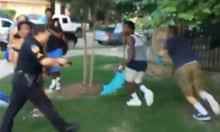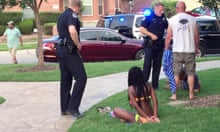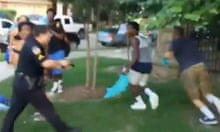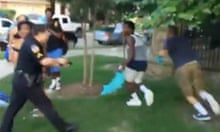Unlike Ferguson, North Charleston or Baltimore, no one was killed or injured here. This is an affluent, mostly white area without a history of serious racial tension.
But the expressions of anger and the demands for change on Monday night in McKinney, Texas, recalled scenes from elsewhere in the US: hundreds of demonstrators protested then marched to the spot where three days earlier a police officer shoved a teenage girl in a bathing suit to the ground, swore and pointed a gun at two unarmed boys.
The officer’s response to a minor fracas at a pool party was so intense that a bystander’s video of Eric Casebolt’s actions turned the weekend event into the latest episode of the broiling controversy over police aggression in their encounters with black people.
The footage posted online had only attracted significant media attention the day before, but the community moved so quickly that about 500 people attended the rally, which began at an elementary school in the city on the northern edge of Dallas. The chants demanding reform and accountability and the “Black Lives Matter” T-shirts and placards underlined the reality that this event was an heir to the outrage that had boiled up in other cities – the latest waypoint for a movement.
Casebolt, who had been with the police department in McKinney for a decade, was placed on administrative leave on Sunday for his role in the incident.
“It may not be Baltimore but folks are going to come out and protest when it’s blatantly wrong,” said Hillis Davis, a 52-year-old from the nearby city of Frisco.
Elbert Denkins, a 44-year-old who works for the US navy, said he came “to support my neighbourhood and everybody who’s involved with it because it’s happening everywhere, it needs to stop”.
He said the wave of protests against the police was empowering. “I think they’re getting some confidence to come out here and not be afraid any more. At one point in time nobody really wanted to say anything. They were like: ‘You know what, they’re going to take care of it’,” he said.
“[But police are] doing it with adults a lot, now children – 14-year-old, 15-year-old celebrating that school is out, at a swimming pool party. That’s just ridiculous. Us coming out here to support this is letting the city of McKinney, north Dallas, wherever they may be, know we’re not going to tolerate it.”

A handful of pro-police demonstrators turned up, one with a banner reading: “This is not a Selma audition”. Meanwhile, claims about the origins of the disturbance were propagated on social media: that dozens of uninvited guests crashed the party, drank, smoked weed, had sex and generally acted like hooligans; that residents fear more trouble; and that the large-scale police response was not an over-reaction.
An interview was posted on YouTube with a woman named Tatiana, one of the party’s organisers, who said that a fight broke out after she and her friends were racially abused by a white woman. Tatiana claimed she was told to go back to her “section 8 home”, a reference to low-rent housing projects that has a particular resonance in this growing city of 150,000 people, 30 miles north of Dallas.
In 2009, the city was sued by a non-profit organisation for allegedly refusing to develop low-income housing on its west side, preferring it be built on the poorer east side. The swimming pool’s location, in the Craig Ranch subdivision in the west of the city, is a good approximation of the suburban American dream: modern, spacious, immaculately manicured and with mansions even a Beverly Hills resident might deem excessively large, available for under $500,000 (£325,000). Census figures show it is about 75% white.
A black teenager who said he was at the party offered the theory that a pool security guard did not realise there were two parties at the pool – one predominantly white, and one black. “He only picked on the black people, saying: ‘Where’s your keycard?’” the boy said.
Jahda Bakari said she went to help Dajerria Becton after Casebolt grabbed her and wrestled her down, face-first. “After he threw the girl to the ground I tried helping her then he punched me in the face,” the 13-year-old said. “I think it was based on race mostly as he was only targeting the black people.”
However, Maurice Gray, a black 41-year-old who said his wife and five children were at the party, disagreed. He said he had lived in the area for three and a half years without encountering any problems with the police and that their response spiralled out of control because of one man’s incompetence rather than any institutional racism.
“These pool parties have been going on for a while. It’s not like this is not normal,” he said. “[People are] trying to make it a race thing but it’s just right and wrong … one officer just kind of went rogue,” he said.

After making the 25-minute walk from the school, accompanied by police who had closed off roads, protesters massed in front of the locked entrance to the pool, which is reached through a building with an aesthetic of country-club-meets-alpine-chalet. Dozens of residents stood outside their homes taking images with their cellphones.
Brian Hettish seemed taken aback by the drama. “Nothing happens here, like, ever. I mean, last year this place was voted best place to live in America. This isn’t a race thing,” the 20-year-old said.
But normality was suspended on Monday night. While demonstrators stood on the grass where the video was filmed and agitated for change, there was no one in the water, save for a plastic turtle float that bobbed gently on the surface. “Pool is temporarily closed for treatment,” said a sign at the gate.





Comments (…)
Sign in or create your Guardian account to join the discussion